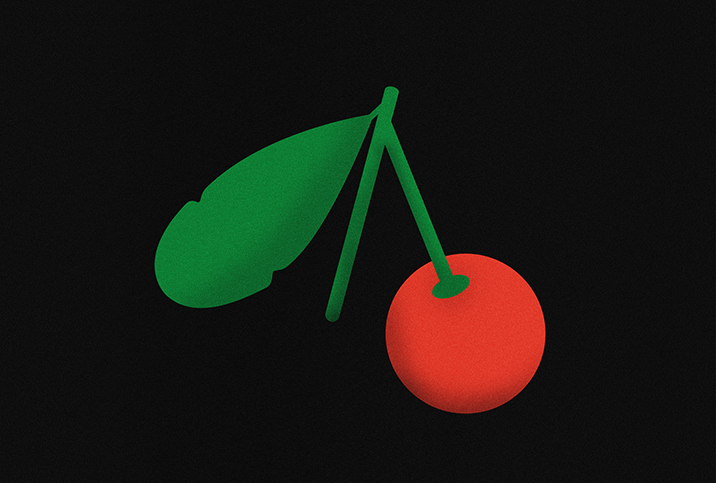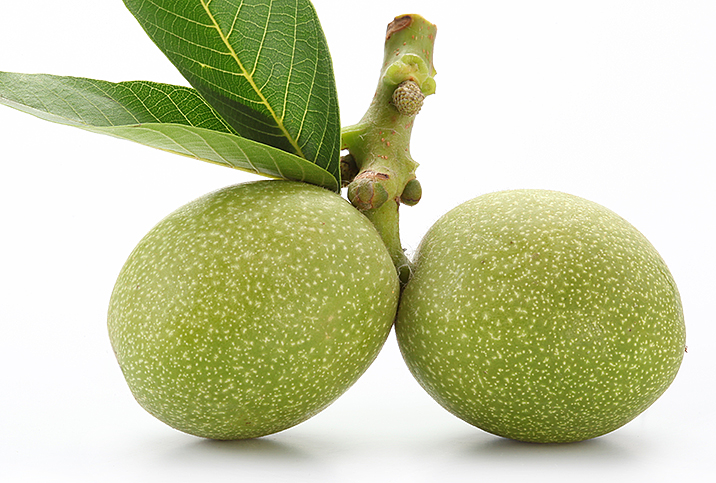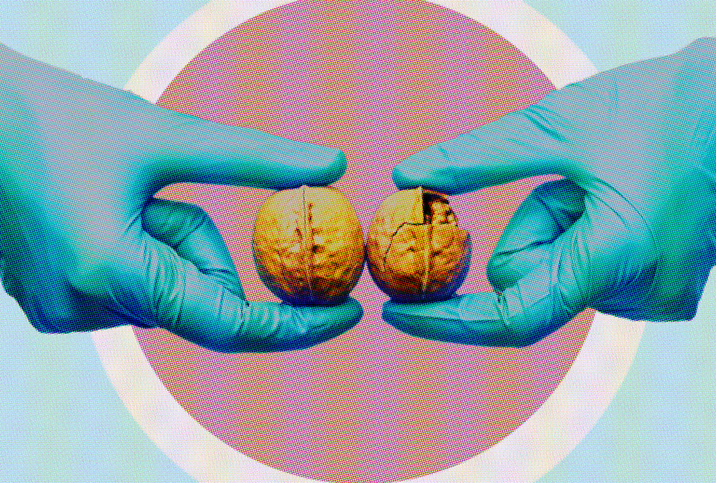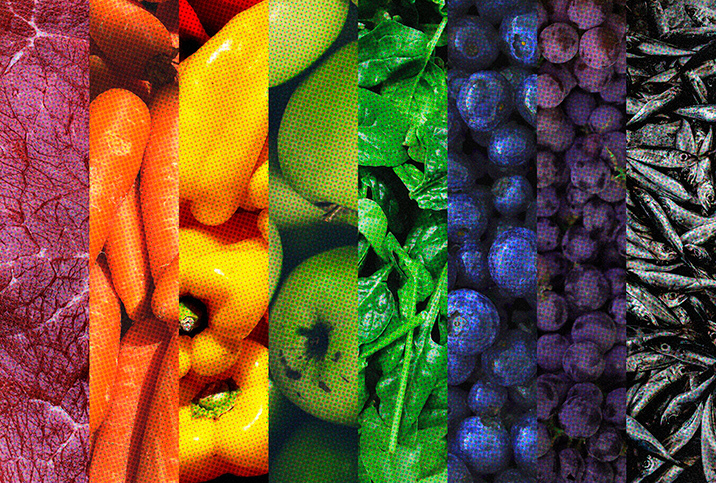What Chemotherapy Really Feels Like
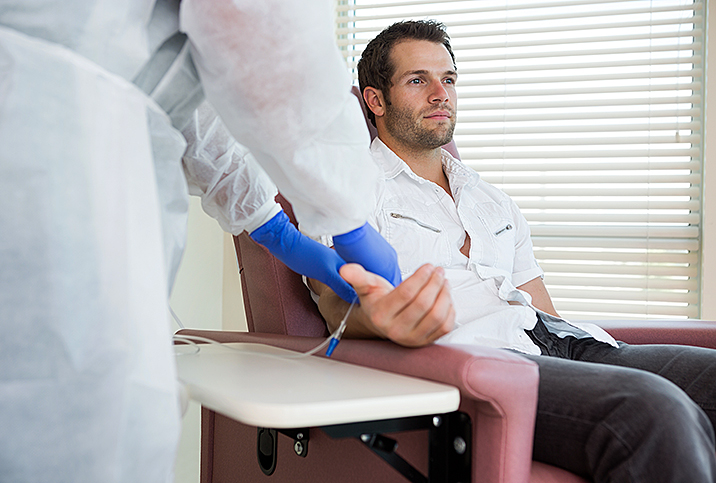
It all started with a lump.
Well, not exactly a lump, but a nearly rock-hard left testicle. I was sitting on the couch in some basketball shorts in 2018 and had just adjusted my testicles—a mindless motion—when I felt it. "Hey, babe, I think one of my balls are hard. Is hard? Are hard?" That's the full quote, actually. My wife, Heidi, said that she knew in that instant what it meant.
I wish I could say the next few days were a whirlwind, but they weren't. They were a complete and absolute slog. Each test led to more questions, but the results were pretty conclusive: The testicular cancer had spread. Everywhere. My entire abdomen was riddled with it. After one CT scan, my surgeon, Dr. Sumeet Bhanvadia, circled a 9-centimeter mass (bigger than my fist) against my kidney and said, "See that? That's not supposed to be there."
I was 34 years old, and my wife and I had just welcomed our daughter to the family the previous summer. On top of that, I was living in Pasadena, California, and had just started my fourth year writing for a successful TV show. The career engine was just starting to purr. But it was about to stall, stop and disintegrate thanks to the cancer filling my abdomen.
Testicular cancer chemo is a long haul.
When they prescribe you chemotherapy, it's not like, "When do you want to begin?" It's more like, "Get your things in order, we start Monday." In my case, I'd die if I didn't. Easy decision.
I was prescribed three rounds of chemo, each identical and each involving three crucial drugs. My regimen was called "BEP": Bleomycin (B), etoposide (E) and cisplatin (P—don't ask me why this one is P). Since I was wondering about the scale of difficulty of this cocktail of chemo drugs, my oncologist—the doctor who works in tandem with my urologist and surgeon while prescribing and overseeing my chemo treatments—Dr. Anishka D'Souza, was quick to explain that while it was good that I was young and healthy, it also meant that I'd receive the highest possible dose.
The first two drugs (bleomycin and etoposide) are nasty. They are extremely gifted at giving you substantial aches and a sense of nausea that prevents you from doing just about anything. I had grand plans for my three months of chemo—my cycle was all three BEP drugs, five days in a row, eight hours a day followed by two weeks off, repeated three times. I found it easiest to just think of it as "one eternity." I was going to watch movies, listen to music, play video games, even write a couple of scripts during all the downtime. In those next three months, I watched exactly four minutes of one movie.
Why? Because cisplatin, that's why
If the first two drugs, bleomycin and etoposide, are World War I and II, cisplatin is a nuclear holocaust that devours light and love and time itself. It is a world killer. A phantom of death. And part of a cocktail that's incredibly good at killing testicular cancer.
"Those first two (drugs) are tough, but that third one makes you forget everything instantly," remembered Kyle Ferris, my one-time college roommate who spent his time in the chemo chair after being diagnosed during summer break back in 2006. "I'd think I'd be doing fine and then they'd give me that shit and I'd fall right back to Earth. It's tough, man. But it works."
Testicular cancer chemo is a long haul. Each session comes in waves: the IV, then the fluid drip, then the bleomycin followed by another fluid drip, the etoposide, another drip and, finally, the cisplatin. The process takes eight hours each time because of how slowly they have to pump the poison into your bloodstream. It's lethal stuff. It takes months and sometimes years for these drugs to leave the body. And that's the point, right? They want these drugs to stay and fight the cancer so it dies and you don't. Modern medicine, man. It's incredible.
Bleomycin and etoposide were administered like any other drug: clear fluid hooked into the IV and shot into my waiting veins. Nausea followed. And the vomiting along with it. And just when you thought you'd had enough, they'd drop the nuke on you.
The first time I watched them bring out the cisplatin, I thought they were kidding. Two nurses entered my cubicle in full hazmat suits while I sat relatively exposed in my sweats. I was convinced my coworkers had set this whole scene up, but it wasn't a joke. My nurses were terrified of the stuff, and for good reason: the cisplatin was housed in a radioactive casing, refracting any outside light. I immediately asked my nurse what was happening and he said cisplatin is basically liquid platinum that's been so refined that if it touches sunlight it will self-combust. That stuff was going inside me. And this was only day one.
I remember asking my nurses which round of chemo was the hardest—the first, second or third? They did something for which I'm forever grateful: They lied. Whichever round I was on (or had just completed), they'd tell me that was the hardest one. "You're done with the tough stretch. Don't even worry," they'd say. It was a lie, but I love them for it.
The truth is that the hardest day of chemo is the second-to-last day. The last day is the last day, so who cares how bad it is. But what you don't know going in is that the treatments add up. And worse yet, they compound. Toward the end of my third cycle, D'Souza told me the cisplatin actually compounds inside the body—so day one is 1x, day two is 2x, day three is 4x, day four is 8x and so on. Would you tell that to a struggling, scared cancer patient on day one?
It's a tough mental block to conquer chemo
It would be maddening for me to talk about my nausea (a lifetime's worth), weight loss (30 pounds, give or take) and hair loss (all gone; my eyebrows barely hung on), but as I sat in that chair, I watched a lot of people struggle better than me; and some worse, too. I got to know people in that chemo ward, and then never saw them again. Some died. I talked with nurses who wouldn't talk back. And when I tried to ask why, I would discover it was for their own self-protection. Losing patients hurts and that changes you. I can't say I blame them.
But chemo wasn't the end of my story. And it wasn't the beginning, either. It was a fantastic second act with a twist no one saw coming, because the goal of my chemo was to kill cancer and make me sick as shit in the process. Ding-ding, it worked. Diagnosed on 9/7/18. Cancer-free since 1/5/19.












